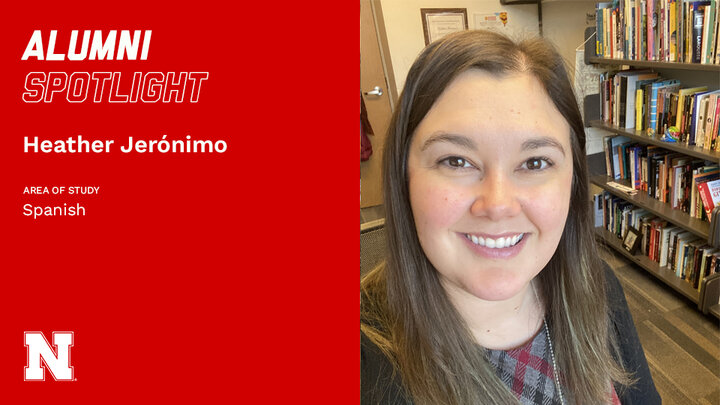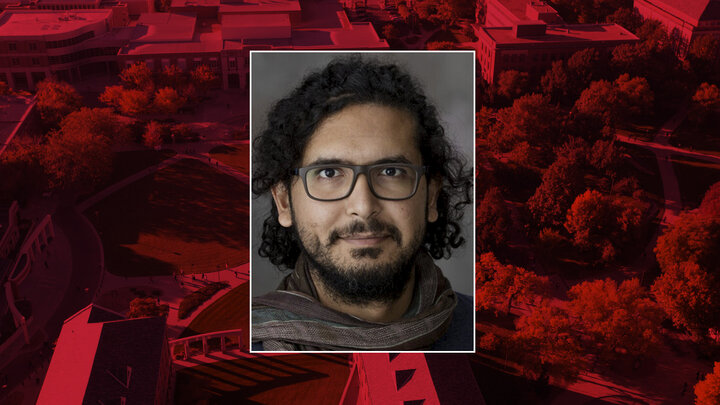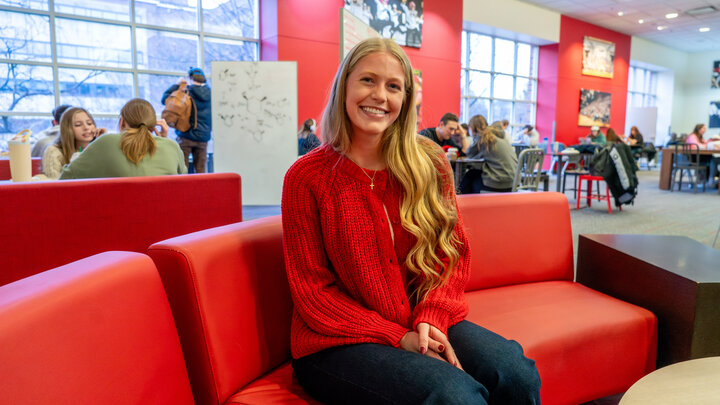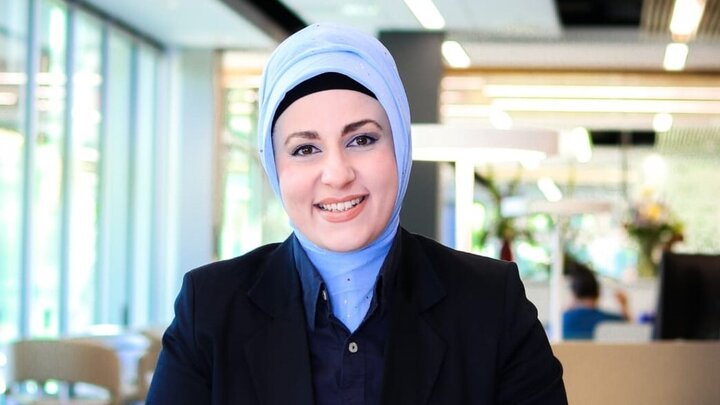Tell us about your trajectory since you graduated from UNL with your PhD in Spanish in 2014. What motivated you to pursue a PhD in Spanish at UNL?
After graduating from UNL in May of 2014, I started as an Assistant Professor of Spanish at the University of Northern Iowa in August of 2014. I have been at the University of Northern Iowa for eleven years now, and I received tenure and promotion to Associate Professor in 2020. I teach a variety of courses in our Spanish program, as well as the occasional course for our Women’s and Gender Studies program.
After studying abroad in Alicante, Spain as an undergraduate student, I knew I wanted Spanish to be a part of my life. I was drawn to UNL because the PhD in Spanish allowed me to combine two of my passions, Spanish and literature. I was excited for the opportunity to gain teaching experience while I furthered my own education.
How did UNL prepare you for your current position as Associate Professor of Spanish at the University of Northern Iowa?
I received a very well-rounded education at UNL, both in content knowledge and teaching experience. I enjoyed studying under captivating content area experts, including Dr. Harriet Turner and Dr. Isabel Velázquez. I learned a tremendous amount about Spanish literature and queer theory from Dr. Iker González-Allende, who also taught me about other aspects of academic life, such as publishing, presenting at conferences, and navigating the job market. My learning was positively impacted by the ability to take classes in other departments, and professors from other programs (like Rose Holz in WGS and Margaret Jacobs in History) were instrumental in my interdisciplinary scholarly formation. I also started to learn how to teach at UNL, as the program gave me the opportunity to teach a variety of classes, including a literature survey. This helped ensure that I was ready to enter the classroom at my tenure-track position with no hesitation.
What are your research interests and areas of specialization?
I specialize in contemporary Spanish literature and film, with an emphasis on non-normative families, aging studies, and queer and feminist theory. I’m also interested in the post-colonial relationship between Spain and Equatorial Guinea and narratives of transnational migration.
You have recently published the monograph Performing Parenthood: Non-Normative Fathers and Mothers in Spanish Narrative and Film. What do you study in your book?
Performing Parenthood (University of Toronto Press) explores the multiplicity within non-normative familial constructions in Spain, referencing examples from literature and film that present a spectrum of familial experiences and allow for a wide range of enactments of the parenthood role. The book concludes that the normative Spanish family does not exist, but rather serves as a concept that obstructs scholars from acknowledging and analysing the multiple familial formations present in contemporary Spain.
Why did you decide to study non-normative parenthood? What did you discover throughout your research?
I find it fascinating how the pervasive concept of the normative, patriarchal family in Spain has been perpetuated through much of Spanish history, often utilized as a rhetorical tool to gain political control or uphold social or cultural norms. In my research, I found that the normative family is more of a myth than a reality. Cinematic and literary representations of contemporary Spanish families reveal a complex assortment of enactments of parenthoods. I argue for an expansion of our conversations about parental identities, positing that they exist on a spectrum that enables many parental figures to disregard heteronormative standards imposed upon the role. In the texts and films that I analyze in Performing Parenthood, many parental figures experience parental identities in meaningful ways through a failure to conform with normative expectations.
How is the book structured? What subjects are covered in the different chapters?
The book begins with a theoretical introduction that provides an overview of the history of the traditional, patriarchal family in Spain, examines current definitions and understandings of the Spanish family, and discusses the state of family studies in Spain. The introduction then establishes my argument for the understanding of parenthood as a performative identity, based on Judith Butler’s theory of gender as performative. There are six substantive chapters that examine a variety of non-normative examples of parenthood in contemporary Spanish literature and film—ranging from gay literary father figures, subversive physical touch between mother and child, fathers who cross-dress, lesbian maternal community building, non-biological parenting, cross-cultural families, disabled bodies, and the role of domestic help within familial formation.
How was the process of writing and publishing the book?
Writing and publishing this book was a long process that taught me so much. The ideas behind this project began within my dissertation. Even though Performing Parenthood includes texts and films that I had analyzed in my dissertation, I had to dedicate a lot of time to revising my ideas, adding new theory, and making my arguments consistent throughout the book. I was awarded a PDA (Professional Development Assignment, essentially a sabbatical) in the spring of 2021 that helped me finish writing the new material and allowed me to polish the manuscript. I then sent a book proposal to the University of Toronto Press, and they expressed interest in considering the manuscript for their Toronto Iberic series. The manuscript was sent out to two reviewers, for whom I am extremely grateful, as they provided me with insightful feedback and suggestions that made the book much better. After completing the edits suggested by my reviewers, the University of Toronto Press offered me a contract, and the publication process began. It was surreal and emotional to receive my author copies of the completed, printed book in July of 2024. This book is truly a passion project, and I’m so grateful to everyone involved in the various stages of creation and publication who helped my book become the best possible version of itself.
What type of audience do you expect to reach with your book?
This interdisciplinary book is intended for academics, independent scholars, and undergraduate and graduate students. Of interest to scholars of contemporary Spain, Latin American or Hispanic literature, literary analysis, queer theory, women’s and gender studies, film studies, affect studies, disability studies, and family studies, I hope my book will make an impact on conversations about the Spanish family, expanding university curriculum to include more diverse representations of the Spanish family. Performing Parenthood is also meant to be a resource for professors who teach about the modern Spanish family, bringing attention to families who have not previously been subjects of academic analysis. The book could easily be assigned reading for classes on film, literature, family studies, or women’s and gender studies.
What are your next research projects?
I am currently co-editing an anthology with Dr. Raquel Medina that is focused on cultural representations of queer aging in Spain. By addressing both the challenges and the joys of this demographic group, the anthology seeks to provide visibility for a community that has often been doubly marginalized due to age and sexual orientation. Another project I am currently excited about is Academic Writing Demystified, a handbook I am co-authoring that is intended to make the writing process understandable, and even enjoyable, for all types of academic writers.
How do you connect your research expertise with your teaching?
I could never separate the two. My research informs the topics I want to teach about, especially in upper-level seminars, as well as the readings and theoretical lenses I bring to the classroom. I am currently teaching a class for UNI’s WGS program called Queer Families around the Globe. The entire class is inspired by my book, even though the course isn’t focused only on Spain. My knowledge of queer theory and non-normative families guides the structure of the class and the ways in which we analyze global literature and film about the family.




